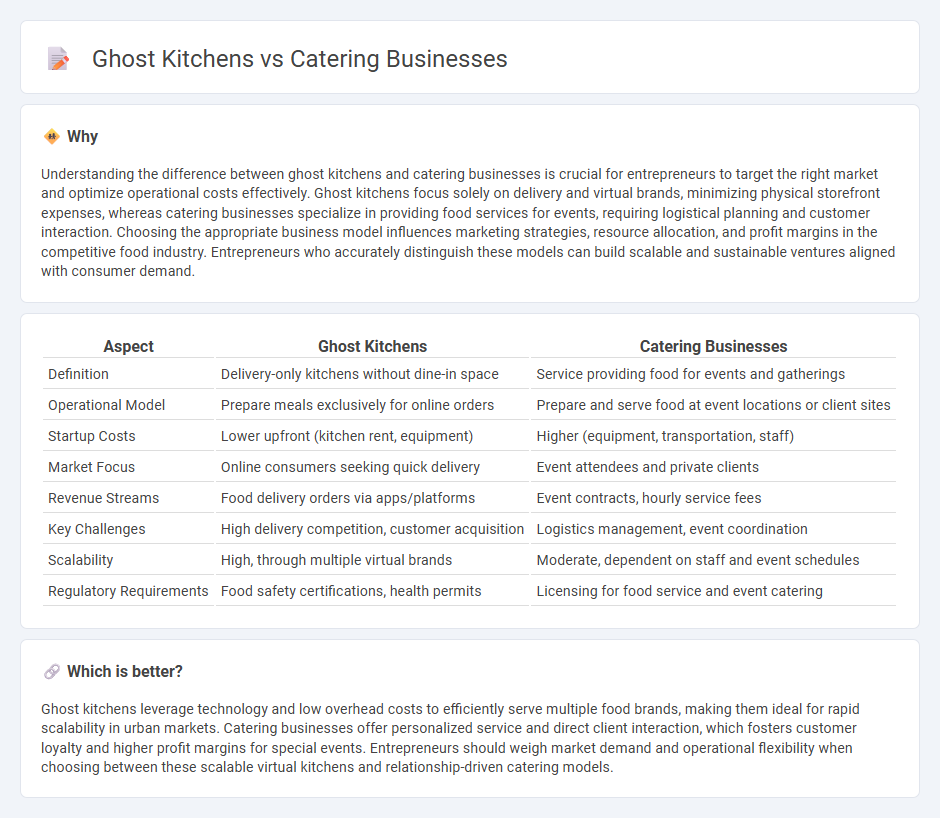
Ghost kitchens operate exclusively through online orders with no physical storefront, reducing overhead costs and enabling rapid scalability. Catering businesses focus on personalized event services, offering customized menus and hands-on customer interaction. Explore the unique advantages and challenges of each model to determine the best fit for your entrepreneurial goals.
Why it is important
Understanding the difference between ghost kitchens and catering businesses is crucial for entrepreneurs to target the right market and optimize operational costs effectively. Ghost kitchens focus solely on delivery and virtual brands, minimizing physical storefront expenses, whereas catering businesses specialize in providing food services for events, requiring logistical planning and customer interaction. Choosing the appropriate business model influences marketing strategies, resource allocation, and profit margins in the competitive food industry. Entrepreneurs who accurately distinguish these models can build scalable and sustainable ventures aligned with consumer demand.
Comparison Table
| Aspect | Ghost Kitchens | Catering Businesses |
|---|---|---|
| Definition | Delivery-only kitchens without dine-in space | Service providing food for events and gatherings |
| Operational Model | Prepare meals exclusively for online orders | Prepare and serve food at event locations or client sites |
| Startup Costs | Lower upfront (kitchen rent, equipment) | Higher (equipment, transportation, staff) |
| Market Focus | Online consumers seeking quick delivery | Event attendees and private clients |
| Revenue Streams | Food delivery orders via apps/platforms | Event contracts, hourly service fees |
| Key Challenges | High delivery competition, customer acquisition | Logistics management, event coordination |
| Scalability | High, through multiple virtual brands | Moderate, dependent on staff and event schedules |
| Regulatory Requirements | Food safety certifications, health permits | Licensing for food service and event catering |
Which is better?
Ghost kitchens leverage technology and low overhead costs to efficiently serve multiple food brands, making them ideal for rapid scalability in urban markets. Catering businesses offer personalized service and direct client interaction, which fosters customer loyalty and higher profit margins for special events. Entrepreneurs should weigh market demand and operational flexibility when choosing between these scalable virtual kitchens and relationship-driven catering models.
Connection
Ghost kitchens and catering businesses are connected through their shared reliance on off-premise food preparation and delivery models that eliminate the need for traditional dine-in facilities. Ghost kitchens optimize operational efficiency by focusing solely on meal production for delivery platforms, which complements catering businesses' demand for bulk food preparation and event-based distribution. This synergy enables entrepreneurs to scale food services rapidly while minimizing overhead costs linked to physical storefronts.
Key Terms
Location
Catering businesses rely heavily on strategic physical locations to manage food preparation, storage, and direct client interactions, often requiring accessible kitchens and event spaces. Ghost kitchens operate without a storefront, optimizing location purely for delivery efficiency, typically situated near dense urban areas or high-demand zones to reduce delivery times. Explore more about how location impacts operational success in both catering and ghost kitchen models.
Overhead Costs
Catering businesses often face higher overhead costs due to expenses such as venue rentals, staff wages, and equipment maintenance, whereas ghost kitchens benefit from streamlined operations with reduced physical space and limited front-of-house expenses. The variable costs for ghost kitchens mainly include food supplies and minimal labor, resulting in improved cost efficiency and scalability. Explore detailed comparisons to understand which model aligns best with your business goals.
Customer Interaction
Catering businesses excel in customer interaction by offering personalized service during events, creating memorable experiences through face-to-face communication and customized menu options. Ghost kitchens prioritize efficiency and scalability, often minimizing direct customer contact by relying on digital ordering platforms and third-party delivery services. Explore how these differing approaches impact customer satisfaction and business growth strategies.
Source and External Links
CNF Catering - Washington, DC - Established in 1986, CNF Catering specializes in full-service catering with high-quality, locally sourced ingredients, serving Fortune 500 companies and private events in the DC Metro area.
RSVP Catering - Washington DC Caterer for Weddings, Social ... - RSVP Catering offers innovative cuisine and top-level service for corporate and social events, with a focus on fresh, creative menus and seamless event execution in the Washington DC area.
VIPS Catering | Delectable Catering in Washington DC, VA & MD - VIPS Catering provides flexible catering solutions including same-day service, from corporate functions to weddings, emphasizing taste, presentation, and reasonable pricing in the DC region.
 dowidth.com
dowidth.com